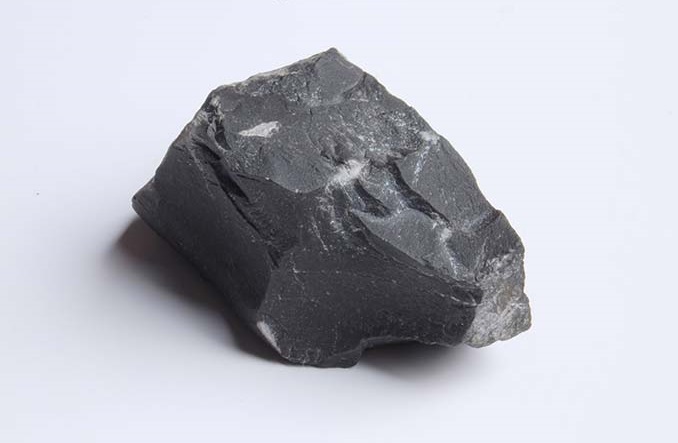Gilsonite
Contents |
[edit] Gilsonite: The Black Gold of Natural Asphalt
Gilsonite, often referred to as "Natural Asphalt" or "Uintahite," is a unique form of natural bitumen found primarily in the Uintah Basin of northeastern Utah, USA. This versatile mineral has a wide array of applications across multiple industries, making it a valuable commodity in today's market. In this blog, we will delve deep into what Gilsonite is, its properties, its various uses, and why it is considered a black gold of natural asphalt.
[edit] What is Gilsonite?
Gilsonite is a naturally occurring solid hydrocarbon, a type of asphaltite, which means it is a naturally occurring asphalt or bitumen. It was first discovered in the late 19th century by Samuel H. Gilson, after whom it is named. Gilsonite is found in the form of veins or dikes that can be several feet wide and extend for miles in length. These veins are mined in much the same way as coal, using conventional mining techniques.
[edit] Composition and Properties
Gilsonite is composed primarily of carbon (about 85%) and hydrogen (about 10%), with small amounts of sulfur, nitrogen, and oxygen. Its chemical composition gives it unique properties that make it highly valuable:
- High Solubility: Gilsonite is soluble in aromatic and aliphatic solvents, making it an excellent additive in various industrial processes.
- High Softening Point: With a softening point between 160°C to 220°C, Gilsonite is ideal for use in high-temperature applications.
- Inert Nature: It is chemically inert and does not react with other substances, making it a stable and reliable additive.
- High Gloss and Black Color: Gilsonite imparts a high gloss and deep black color when used in inks, paints, and coatings.
[edit] Mining and Production of Gilsonite
The extraction of Gilsonite is done through mining operations. The veins are typically found at depths ranging from a few feet to several hundred feet. The mining process involves drilling, blasting, and collecting the ore, which is then transported to processing facilities. At these facilities, the Gilsonite is crushed, ground, and refined to meet the specific needs of different industries.
[edit] Environmental Considerations
Mining Gilsonite is a relatively environmentally friendly process compared to other forms of mining. The primary environmental concern is the potential for surface disturbance and habitat disruption, but modern mining practices aim to minimize these impacts. Additionally, Gilsonite mining produces less waste compared to other types of mining, as the ore is of high purity and requires minimal processing.
[edit] Applications of Gilsonite
Gilsonite's unique properties make it suitable for a wide range of applications across various industries. Here are some of the primary uses of this versatile mineral:
[edit] 1. Asphalt and Road Construction
One of the most significant applications of Gilsonite is in the asphalt and road construction industry. When added to asphalt mixtures, Gilsonite enhances the properties of the asphalt, providing several benefits:
- Increased Durability: Gilsonite improves the durability and longevity of asphalt pavements by increasing their resistance to deformation and cracking.
- Enhanced Performance: It enhances the performance of asphalt in both high and low temperatures, making it suitable for use in diverse climates.
- Cost-Effectiveness: By improving the properties of asphalt, Gilsonite reduces the need for frequent repairs and maintenance, leading to cost savings over the long term.
[edit] 2. Inks and Paints
Gilsonite is widely used in the production of inks and paints due to its high gloss and deep black color. It is an essential component in black printing inks, where it provides excellent adhesion, fast drying times, and resistance to smudging. In paints, Powder Gilsonite is used as a pigment and binder, enhancing the overall quality and appearance of the final product.
[edit] 3. Oil and Gas Industry
In the oil and gas industry, Gilsonite is used as an additive in drilling fluids and cementing materials. It helps to control fluid loss, stabilize wellbores, and improve the overall performance of drilling operations. Gilsonite's unique properties make it an excellent choice for use in challenging drilling environments, such as high-temperature and high-pressure wells.
[edit] 4. Foundry and Metallurgy
Gilsonite is also used in the foundry and metallurgy industries as a carbon additive in the production of steel and other metals. It acts as a reducing agent, helping to remove impurities and improve the quality of the final product. In foundries, Gilsonite is used in the manufacture of molds and cores, providing excellent surface finish and dimensional stability.
[edit] 5. Construction Materials
Beyond asphalt, Gilsonite is used in the production of various construction materials, such as sealants, adhesives, and waterproofing compounds. Its high solubility and adhesive properties make it an ideal ingredient in these products, enhancing their performance and durability.
[edit] 6. Agriculture
In agriculture, Gilsonite is used as a soil conditioner and fertilizer additive. Its high carbon content helps to improve soil structure, increase water retention, and promote healthy plant growth. Additionally, Gilsonite's inert nature ensures that it does not react with other soil components, making it a safe and effective agricultural input.
[edit] Benefits of Using Gilsonite
The unique properties and versatile applications of Gilsonite offer numerous benefits across different industries. Here are some of the key advantages of using Gilsonite:
[edit] 1. Improved Product Performance
Gilsonite's high solubility, softening point, and inert nature make it an excellent additive in various products, enhancing their performance and quality. Whether it's improving the durability of asphalt pavements or the gloss of printing inks, Gilsonite delivers superior results.
[edit] 2. Cost Savings
By enhancing the properties of materials and reducing the need for frequent repairs and maintenance, Gilsonite offers significant cost savings over the long term. In industries like road construction and oil drilling, where durability and performance are critical, the use of Gilsonite can lead to substantial economic benefits.
[edit] 3. Environmental Benefits
Gilsonite mining has a relatively low environmental impact compared to other forms of mining, and the mineral itself is non-toxic and chemically inert. This makes it a more sustainable and environmentally friendly option for various applications.
[edit] 4. Versatility
The wide range of applications for Gilsonite demonstrates its versatility and adaptability. From road construction to agriculture, Gilsonite is a valuable resource that can be used in diverse industries, making it a highly sought-after commodity.
[edit] Challenges and Future Prospects
While Gilsonite offers numerous benefits, there are also challenges associated with its use and extraction. One of the primary challenges is the limited geographical distribution of Gilsonite deposits, which are primarily found in the Uintah Basin of Utah. This can lead to supply constraints and potential fluctuations in prices.
[edit] 1. Technological Advancements
Advancements in mining and processing technologies are helping to address some of these challenges by improving the efficiency and sustainability of Gilsonite extraction. Additionally, ongoing research and development efforts are focused on discovering new applications and enhancing the performance of Gilsonite-based products.
[edit] 2. Market Demand
The demand for Gilsonite is expected to continue growing, driven by its wide range of applications and the increasing focus on sustainable and cost-effective materials. As industries seek to improve the performance and durability of their products, Gilsonite will remain a valuable resource.
[edit] Conclusion
Gilsonite, the black gold of natural asphalt, is a unique and versatile mineral with a wide array of applications across various industries. Its high solubility, softening point, and inert nature make it an excellent additive in products ranging from asphalt and road construction materials to inks, paints, and drilling fluids. The benefits of using Gilsonite, including improved product performance, cost savings, and environmental sustainability, make it a valuable commodity in today's market.
Despite the challenges associated with its limited geographical distribution, ongoing technological advancements and growing market demand ensure a bright future for Gilsonite. As industries continue to seek innovative solutions to enhance the performance and durability of their products, Gilsonite will remain an essential and highly sought-after resource. Whether you're involved in construction, manufacturing, agriculture, or any other industry, understanding the unique properties and applications of Gilsonite can help you leverage its benefits and stay ahead in the competitive landscape.
In summary, Gilsonite is not just a natural asphalt; it is a versatile and valuable mineral that offers numerous advantages across different sectors. Its unique properties and wide range of applications make it a true black gold, providing both economic and environmental benefits. As we continue to explore and harness the potential of Gilsonite, it will undoubtedly play a significant role in shaping the future of various industries and contributing to sustainable development.
[edit] Related articles on Designing Buildings
- Asphalt
- Binder course.
- Bituminous mixing and laying plant.
- Composites.
- Construction materials
- Groundwater control in urban areas.
- Highway drainage.
- Infrastructure.
- Kerbs.
- Mastic Asphalt Council.
- Mastic asphalt flooring.
- Metal in construction.
- Mobile asphalt stations.
- Overview of the road development process.
- Pavegen.
- Pavement.
- Phase change materials.
- Resilient flooring.
- Road construction.
- Road joints.
- Runway construction.
- Sustainable materials for construction.
- Types of biobased materials.
- Types of materials.
- Types of road and street.
- Use of ceramics in construction.
Featured articles and news
Inspiring the next generation to fulfil an electrified future
Technical Manager at ECA on the importance of engagement between industry and education.
Repairing historic stone and slate roofs
The need for a code of practice and technical advice note.
Environmental compliance; a checklist for 2026
Legislative changes, policy shifts, phased rollouts, and compliance updates to be aware of.
UKCW London to tackle sector’s most pressing issues
AI and skills development, ecology and the environment, policy and planning and more.
Managing building safety risks
Across an existing residential portfolio; a client's perspective.
ECA support for Gate Safe’s Safe School Gates Campaign.
Core construction skills explained
Preparing for a career in construction.
Retrofitting for resilience with the Leicester Resilience Hub
Community-serving facilities, enhanced as support and essential services for climate-related disruptions.
Some of the articles relating to water, here to browse. Any missing?
Recognisable Gothic characters, designed to dramatically spout water away from buildings.
A case study and a warning to would-be developers
Creating four dwellings... after half a century of doing this job, why, oh why, is it so difficult?
Reform of the fire engineering profession
Fire Engineers Advisory Panel: Authoritative Statement, reactions and next steps.
Restoration and renewal of the Palace of Westminster
A complex project of cultural significance from full decant to EMI, opportunities and a potential a way forward.
Apprenticeships and the responsibility we share
Perspectives from the CIOB President as National Apprentice Week comes to a close.
The first line of defence against rain, wind and snow.
Building Safety recap January, 2026
What we missed at the end of last year, and at the start of this.























